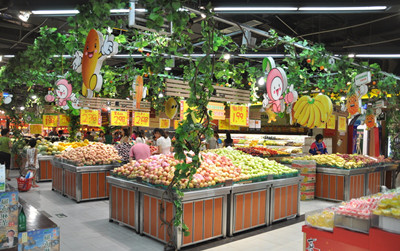(单词翻译:单击)
中英文本
Grocery shopping
超市大采购
Aisle be damned
该死的通道
For the best bargains, avoid shopping around for your groceries
欲求物美价廉货,货比三家要不得
THRIFTY shoppers do not have to look far to find a bargain. Offers abound in the cut-throat world of British supermarkets. Received wisdom suggests that people trying to save money on their groceries should shop around to get the best prices. But research presented on April 9th at the Royal Economic Society suggests that those who do so end up paying more.
节俭的消费者们不需要寻觅很远就能买到便宜货。英国残酷的超市世界中其实充斥着很多这样的便宜货。一种广泛被接受的观点认为,想要在购物上省钱的人们就应该货比三家,这样才能找到最理想的价格。但是4月9日由皇家经济协会展出的研究指出,那些货比三家的人通常到最后反而花的更多。

Kun Tian, a researcher at Cardiff Business School, and Ji Yan of Durham University, the paper's authors, argue that people who buy all their groceries at just one of the big supermarkets (Tesco, Sainsbury's, Asda and Morrisons) pay less than those who purchase equivalent goods at a mixture of the four of them. Data from Kantar Worldpanel, a market-research firm, show similar trends. Unlike Mr Tian's study, these cover total purchases rather than comparing equivalent baskets of goods. They show that people who bought groceries in just one store during the 12 weeks to September 2013 spent 631. Those who went to ten different places, by contrast, forked out 1,249.
研究论文的作者是来自卡迪夫商学院的研究员田坤,以及来自杜伦大学的延吉,他们认为仅在四家大型超市其中某一家购物的人(分别是特易购、森宝利、阿斯达以及莫里森超市)会比在四家分别消费等值商品的人花费的要少。我们也能从市场研究公司凯度消费者指数研究处提供的数据中看到同样的趋势。不过该数据与田坤的研究不一样的地方在于其数据涵盖了所有的消费品,而不仅仅是对比等值的商品。数据指出,只在一家超市购物的消费者在2013年9月之前的12周内只花费了631英镑,而相比之下,那些在十家不同超市分别购物的人最终却支出了1249英镑。
Many of those high-spending shoppers probably had money to burn. But bargain-hunters who visit lots of shops are exposed to more products, and thus more likely to buy things they had not planned to, argues Phil Dorsett, an analyst at Kantar. Mr Tian reckons that promiscuous shoppers suffer from missing out on savings offered to more loyal customers, especially those earned after spending a lot in a particular store. Shoppers who frequent an abundance of different outlets also tend to be older, says Mr Tian. They are less likely than people with young families to take advantage of deals that require them to buy goods in bulk.
很多高消费的购物者们大多数可能都钱多的烧得慌。但是凯度研究所的分析师菲尔·多赛特指出,那些会逛很多家超市爱捡便宜的消费者往往会暴露在更多的商品中,因而更有可能会购买计划之外的商品。而田坤认为逛多家超市的消费者也会错失享受折扣的机会,这些折扣一般是提供给更为忠诚的顾客们,特别是那些在某一家特定的超市大量消费就能获得的折扣。田坤还指出,常去多家不同便利店的购物者也趋向于更为年长,因为和有着年轻家庭的青壮年相比,他们享受需要大量购买商品才能打折的优惠的可能性要低得多。
Those who buy their groceries in fewer emporia—and so spend less—are also more likely to do their shopping online. And on the internet they are more likely to buy products from supermarkets' cheaper own-label ranges, says Edward Garner, also of Kantar. Supermarkets do not always stock such ranges in their small convenience outlets; people shopping in a hurry may as well be encouraged to buy more expensive varieties. In big stores, low-cost lines may be stashed well above or below a harried shopper's line of sight. Search a supermarket's online store, however, and they pop up just as appetisingly as more expensive brands. That provides much less scope for shelf deception.
选择在较少商业中心里购物的人们(同样也花的更少)也更可能选择上网购物。并且在网上消费者买到超市中更为廉价的自有品牌产品的可能性更高,凯度研究所的另一位员工爱德华·加纳这样说道。超市也不总是在它们的小型便利连锁店里囤自有品牌产品;匆忙的消费者倒不如说是被鼓励去购买更为昂贵种类的商品了。在大型商店中,琳琅满目的商品总是会令购买者眼花缭乱,而低价产品往往会被堆放至高于或低于购买者视线所及之处的地方。然而在网上超市搜索低价产品的话,它们就会突然出现在你面前,和那些更为昂贵的品牌产品一样令人蠢蠢欲动。这就大大缩小了货架骗术施展的范围。译者:朱大素 校对:曾擎禹
译文属译生译世
重点讲解
1.end up 结束;告终
例句:We will end up living in a society where life is cheap.
我们最终将生活在一个视人命为儿戏的社会。
2.plan to 打算;计划
例句:The Canadians plan to deliver more food to southern Somalia.
加拿大计划向索马里南部地区运送更多的食品。
3.tend to 倾向于;趋向
例句:We tend to meet up for lunch once a week.
我们往往每周共进一次午餐。
4.likely to 倾向于;可能要
例句:The fires are likely to permanently deforest the land.
这些火灾很可能会彻底毁掉这片土地上的森林。


